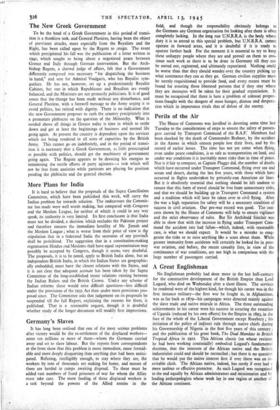Perils of the Air
The House of Commons was justified in devoting some time last Tuesday to the consideration of steps to ensure the safety of passen- gers carried by Transport Command of the R.A.F. Members had been shocked by the death of Commander Brabner, by the accident in the Azores in which sixteen people lost their lives, and by the record of earlier losses. The time has not yet come when flying, even under peace conditions, is as safe as transportation on land, and under war conditions it is inevitably more risky than in time of peace. Nor is it fair to compare, as Captain Plugge did, the number of deaths which have occurred under Transport Command, flying over sea and ocean and desert, during the last five years, with those which have occurred in flights undertaken by privately-run American air lines. But it is absolutely essential that nothing should be left undone to ensure that this form of travel should be free from unnecessary risks, and that we should be building up in Transport Command a system and a tradition which will later be taken over in civil flying. After the war a high reputation for safety will be a necessary condition of success in civil aviation. Our pre-war record was good. The con- cern shown by the House of Commons will help to ensure vigilance and the strict observance of rules. But sir Archibald Sinclair was able to show that with the increase in flying under Transport Com- mand the accident rate had fallen—which, indeed, with reasonable care, is what we should expect. It would be a mistake to exag- gerate the risks or to raise anything like a scare about them. While greater immunity from accidents will certainly be looked for in post- war aviation, and before, the recent casualty lists,. in view of the continuance of war conditions, are not high in comparison with the large number of passengers carried.


























 Previous page
Previous page